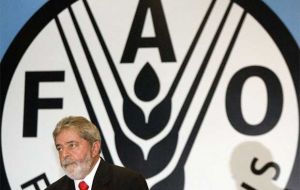MercoPress. South Atlantic News Agency
FAO asks Latam for help to prevent high food prices
 Pte. Lula da Silva open FAO meeting in Brasilia
Pte. Lula da Silva open FAO meeting in Brasilia The governments of Latin America must act to prevent high global food prices from increasing malnutrition in the region, officials from the UN Food and Agriculture Organization warned this week in Brasilia.
"There's a risk that more people won't be able to afford basic foods anymore, increasing malnutrition in the region," said Fernando Soto, regional policy head for FAO. He added that low-income, food-importing countries, most of them in Central America, were most vulnerable. Across the globe, bread, milk and other foods have become more expensive, fueling inflation in some countries. Food riots in Haiti over high prices for rice, beans and other food staples led to the ouster of the government on Saturday. Latin America produced 40% more food than it needed but the problem was poor income distribution, said Jose Graziano, FAO representative for Latin America and the Caribbean. "There shouldn't be a single hungry person in Latin America and yet there are 50 million under-nourished (people)" Graziano said. Haiti was the only country in the region with a food crisis that required immediate international aid, he added. Experts blamed price rises on strong demand by Asian emerging markets, adverse climate in some producer countries, and increased use of corn to produce ethanol in the United States. Speculation by investors exacerbated the trend, said Graziano, who sees prices remaining high for some time. "A record (global) grain crop for the third consecutive year will be insufficient to replace depleted stocks," said Graziano. Among policy options delegates are discussing are levies on food exports and tax breaks on imports. "There needs to be more mitigation efforts" Soto said. Some delegates cited as a model Brazilian President Luiz Inacio Lula da Silva's flagship social welfare program "Zero Hunger," which is helping reduce poverty in some regions. Brazil is a global agricultural powerhouse and leading exporter of several foodstuffs. The FAO also is expected to recommend to its member countries strengthening family agriculture as a way to boost food supply and self-sufficiency. In some countries, small-scale farmers account for as much as 40% of foodstuff production.




Top Comments
Disclaimer & comment rulesCommenting for this story is now closed.
If you have a Facebook account, become a fan and comment on our Facebook Page!